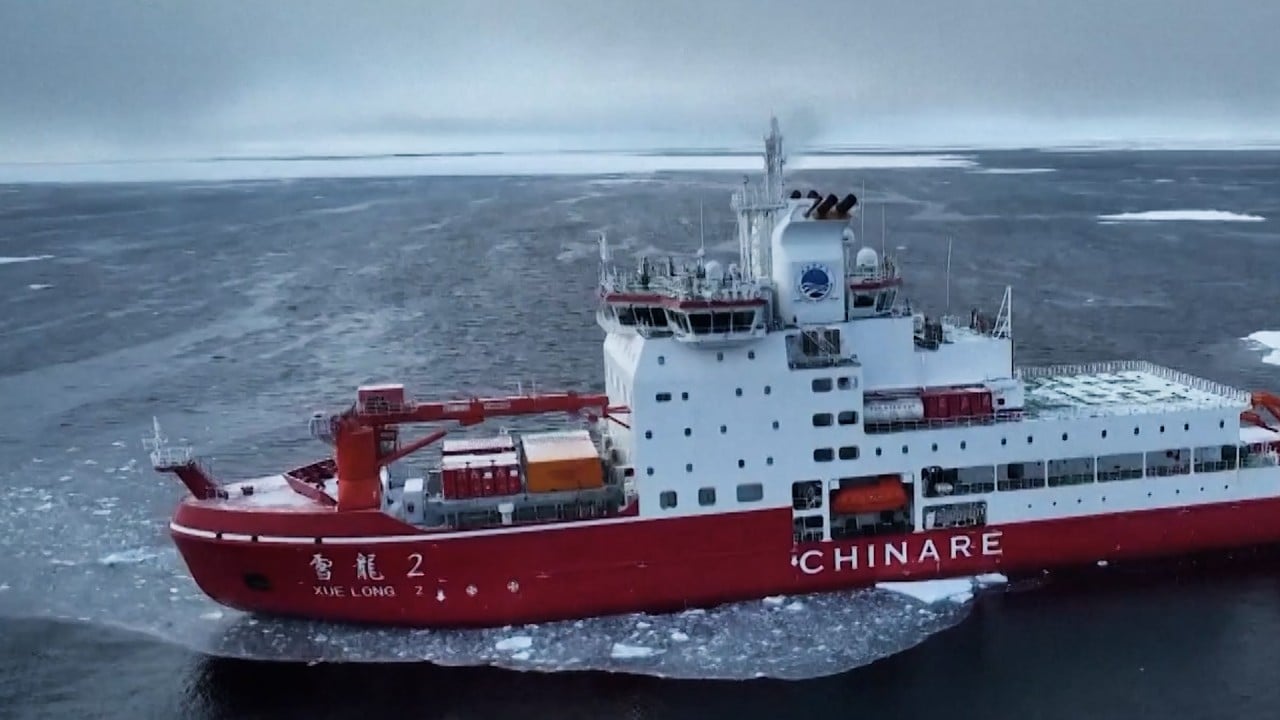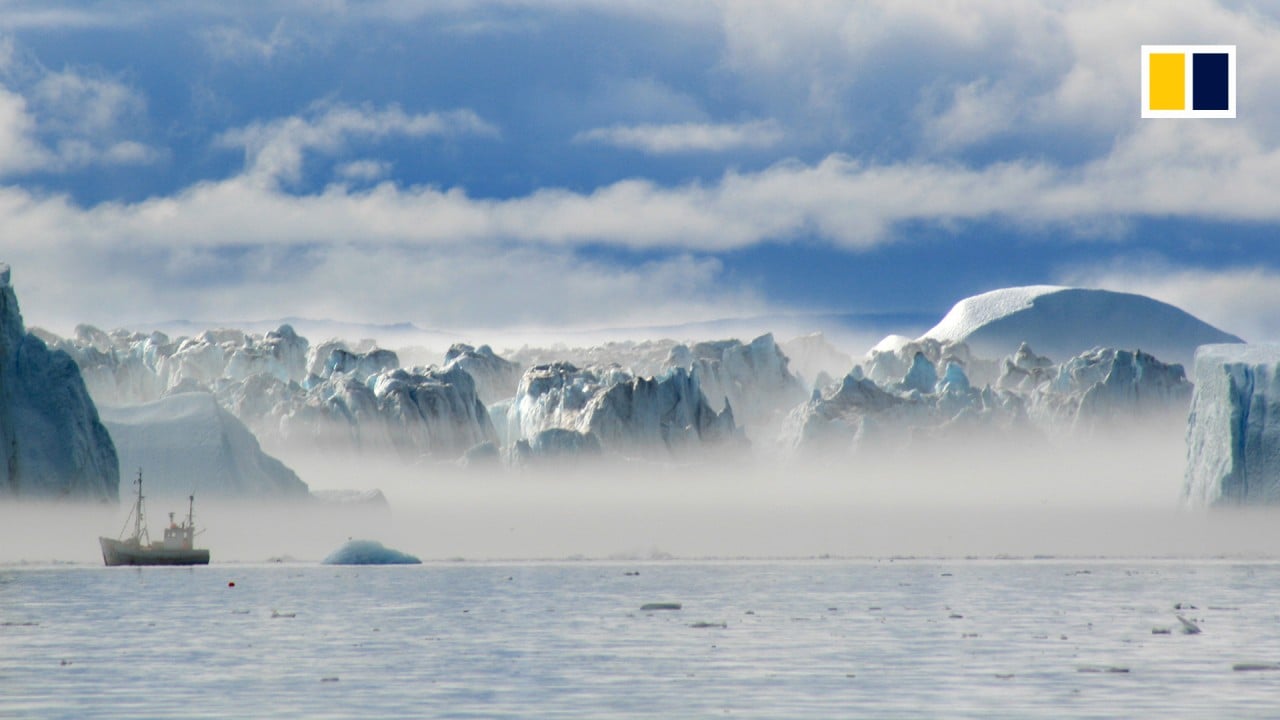
Is China-Russia cooperation in the Arctic a double-edged sword for Beijing?
- China’s expanding interests in the region could see it caught in the crossfire between Moscow and the West’s power contest, observers say
- At the same time, Russia’s willingness to strike scientific and economic partnerships align with Beijing’s Arctic ambitions
The Arctic Ocean – sandwiched between North America, Europe and Asia – was one of the most mysterious front lines in the great power rivalry of the Cold War, where Soviet and US submarines shadowed each other beneath the ice.
Decades later, deteriorating relations between Russia and the West – exacerbated by the war in Ukraine – have ignited fears that the frozen region could once again become an arena for geopolitical contest.
During the Cold War, the Arctic offered the shortest flight paths for intercontinental missiles and nuclear-armed bombers between the then Soviet Union and the Nato allies.
Now the rapid shrinking of the region’s ice caps is also offering new sea lanes and access to precious resources, fuelling concerns that the Arctic could emerge as one of the most strategically valuable maritime routes in the world.
And China – which has been expanding its economic, scientific, cultural and diplomatic engagement with several Arctic countries in recent years – is facing a growing risk of being caught in the crossfire, observers say.
Days later, at the Arctic Circle Assembly – an annual gathering of governments, indigenous organisations and academics – in Reykjavik, Nato Admiral Rob Bauer took a swipe at the growing alignment in the region between Russia and China.
“The increasing competition and militarisation in the Arctic region, especially by Russia and China, is worrying,” said Bauer, an adviser to the Nato secretary general and the North Atlantic Council, the bloc’s principal political decision-making body.
“The melting ice in the Arctic allows for new sea routes that make sailing easier for larger vessels and shorten the time it takes to navigate.
“Nato does not consider China as a threat, but as a challenge. We must take into account that Beijing does not have transparent intentions in the Arctic while concurrently developing its strategic relation to Russia.”
The Russia-controlled North Sea Route could become ice-free as early as the summer of 2035, according to some predictions, cutting shipping times by 30 to 40 per cent compared with the Suez Canal.
But more importantly, it would allow the Russian navy to travel freely between the Atlantic and Pacific oceans.
Zhao Long, senior research fellow with the Shanghai Institutes for International Studies’ Russian and Central Asian studies centre, said the region was likely to become “a frontier in the strategic and security rivalry between Russia and the West”.
“Meanwhile, China’s cooperation with Russia in the Arctic would become a casualty of this antagonism and it is likely to be targeted more often in the future,” he said.
According to Zhao, a push by the West for major Arctic states Finland and Sweden to join Nato will deepen the acrimony between Moscow and the West, “triggering some contagion effects”.
The Russian invasion of Ukraine jolted multilateral cooperation in the region when seven of the eight members of the Arctic Council – the High North’s primary intergovernmental body – announced a boycott against Russia.
Marc Lanteigne, an associate professor at the University of Tromso in Norway, said “2023 is definitely not 2018, when China published its Arctic White Paper” and that Beijing had to “walk a fine line” in the “more difficult diplomatic atmosphere”.
“The movement towards securitising the Arctic has only accelerated since the invasion of Ukraine and Nato’s responses, and so Beijing has to … maintain strong northern cooperation with Russia, but also find ways of being active in other parts of the Arctic, despite the more difficult diplomatic atmosphere,” Lanteigne said.
As its invasion of Ukraine entered its second year, Moscow appeared to be shifting its stance on international cooperation in the Arctic, where 53 per cent of the coastline belongs to Russia.
In February, an amendment to Moscow’s strategic policy for the region to 2035 removed reference to “strengthening good neighbourly relations with the Arctic states” in favour of developing bilateral relations with foreign states.
One month later, the Kremlin named the Arctic as a priority region for the first time, in its first foreign policy concept statement since 2016. Development of the Northern Sea Route was also listed as a key national objective.
And in April, Russia announced plans to develop an international Arctic science station in Norway’s Svalbard islands, in cooperation with China and the other members of Brics – an association of leading emerging markets – Brazil, India and South Africa.
It was a sharp change in direction for Russia, which previously preferred to keep Arctic affairs within the Arctic countries, and an opportunity for China, with its ambitions to become a powerful player in the region.
“On the other hand, this could also increase the political and commercial risks to Chinese companies. So I think it is a double-edged sword [for China],” according to Zhao in Shanghai.
Xu Qingchao, an associate professor with the University of Chinese Academy of Sciences, pointed out that the power game between Russia and the West in the Arctic was not new.
Beijing would not be taking sides and would continue its cooperation with the other Arctic states, in line with China’s interests in the region, she said.
“China’s Arctic strategy was, is, and will be based upon this premise. The strategy may be influenced by various factors, but fundamentally, it is rooted in China’s national interests.”
But Xu shares Zhao’s view that the change to the status quo in the Arctic region in the past two years could be a double-edged sword for China.
“China may be burdened by this dichotomy, being seen by the West as siding with Russia, which in turn may intentionally reduce or curb cooperation with China over the Arctic,” she said.
“But on the other hand, China is more likely to be accepted by Russia, which may be keen to see more robust cooperation with China in the Arctic.”
Since the Russian invasion of Ukraine, China – which has refused to join the West’s economic sanctions – has steadily intensified its activities in the region, pouring tens of billions of dollars into infrastructure projects above the Arctic Circle.
China is also buying Russian oil and gas, some of which is being shipped through the Northern Sea Route, and Chinese naval vessels have been joining their Russian counterparts in regular sailings off Alaska since 2021.
In April this year – just a month after China’s President Xi Jinping visited Moscow – the two countries signed an agreement to work together in maritime law enforcement.
Chinese investment in the Arctic was back on the agenda soon after Beijing lifted its Covid-19 border controls.
In May, senior officials from the Arctic region of Russia were among a high-level delegation to Beijing and Shanghai, led by Russian Prime Minister Mikhail Mishustin.
Chinese business leaders have also travelled to Russia’s Arctic region, including the resource-rich Nenets Autonomous Okrug, the most sparsely populated part of the Russian Federation.
In September, senior executives of Shandong Port Group, a state-owned enterprise, visited Murmansk, widely known as the capital of the Arctic region and the starting point for the Northern Sea Route.
The city’s governor Andrei Chibis, who hosted the executives, said they expressed interest in the route as well as ship building investments in the Kola Peninsula, according to a report by Norwegian news portal The Barents Observer.
Russia’s Arctic ambassador Nikolay Korchunov told reporters in Moscow earlier this month that the two governments were in talks over a number of projects “of economic and scientific importance to both countries”.
These included a cooperation deal with China’s Harbin Engineering University on the Snowflake International Arctic Station, a year-round renewable energy-powered research facility, he said.
Next month, the southern Chinese city of Guangzhou is expected to host the China-Nordic Arctic Cooperation Symposium, for the first time since 2019, in a sign that China intends to continue cooperating with the other Arctic states.
According to Lanteigne, while China and Russia hold the same view that Nato represents an obstacle to their Arctic strategies, the region is unlikely to become a focus in the rivalries between the US, China and Russia.
“Yet there is the strong possibility of spillover, given the ongoing opening up of the Arctic Ocean to economic activities,” he said.
In Shanghai, Zhao said China was unlikely to hold back its business and scientific cooperation with Russia in the Arctic, but it may face increasing risks, such as “fluctuating returns and market trade-offs as a result of potential sanctions”.
“In the long run, China’s cooperation with Russia in the Arctic will not change but at the same time, Russia [is stepping] up its opening-up in the Arctic, and that would provide more opportunities for China, in scientific research, environment and ecology, shipping, energy and tourism.”




